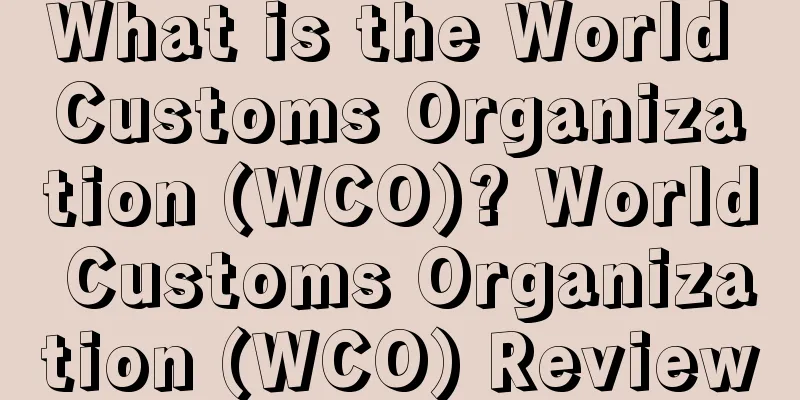What is the World Customs Organization (WCO)? World Customs Organization (WCO) Review

|
The World Customs Organization (WCO) is an intergovernmental organization that helps member countries communicate and collaborate on customs affairs. Official website www.wcoomd.org Founded in 1952 The World Customs Organization, formerly the Customs Cooperation Council (CCC), is an international customs organization and a global intergovernmental coordination organization established to unify tariffs and simplify customs procedures. In 1947, some European countries established the "European Customs Union Study Group". Overview The World Customs Organization is an independent, intergovernmental, multilateral international organization. It was established in Brussels in 1952 as the Customs Cooperation Council. The Council meets once a year in June, usually in Brussels. However, one meeting is held outside Brussels every three years. Its headquarters are in Brussels, Belgium. Development History Since the beginning of the 20th century, the international community has been working tirelessly to promote the standardization and coordination of customs systems and facilitate the development of international trade. As early as 1923, the League of Nations signed an International Convention on the Simplification of Customs Procedures in Geneva, and the General Agreement on Tariffs and Trade (GATT) of 1947 also included some customs-related issues (such as customs valuation). However, at that time, there was no specialized agency responsible for reviewing customs procedures or making recommendations for their simplification and coordination. On September 12, 1947, in Europe devastated by the Second World War, 13 countries signed a joint statement in Paris, agreeing to study the possibility of establishing a specialized agency in Brussels responsible for studying and coordinating customs systems in order to achieve the goal of promoting the standardization and coordination of customs systems and facilitating the development of international trade. Since then, the European Customs Union has established a special group to be responsible for this research. In 1948, the research group established an Economic Committee and a Customs Committee. Later, the Economic Committee ceased its activities because its work was duplicated with that of the Organization for European Economic Cooperation (OEEC). The OEEC was responsible for implementing the work related to the United States' assistance to Europe. Later, it was replaced by the Organization for Economic Cooperation and Development (OECD). However, the work of the Customs Committee has continued, mainly responsible for three aspects of work, including comparative research on customs technical issues of some countries to coordinate and standardize the customs systems of these countries; formulate a unified commodity classification catalog and adopt a unified price definition for customs valuation; at the same time, it also studies other aspects of customs regulations. These three aspects of work laid the foundation for the three conventions signed in Brussels on December 15, 1950. The three conventions are: 1. Convention Establishing a Customs Cooperation Council (entered into force on November 4, 1952) 2. Convention on the Valuation of Goods for Customs (entered into force on July 28, 1953) 3. Convention on the Classification of Goods for Customs Tariffs (entered into force on September 11, 1959) The Customs Cooperation Council was thus born in Brussels, the capital of Belgium, in 1952. The first plenary meeting of the Council was held on January 26, 1953, with 17 member delegations attending the meeting. Later, January 26 was designated as "International Customs Day", and the WCO and many member customs organizations held some activities on this day every year, such as celebrating the anniversary of the establishment of the WCO and promoting customs. In June 2002, when the WCO was celebrating its 50th anniversary, the 99th/100th Annual Meeting of the WCO Council held a large-scale celebration. The WCO has a total of 161 members, each of which has the same rights and obligations. The first non-European member to join the organization was Pakistan. China became a full member of the organization in 1983. Hong Kong, China and Macao, China joined the WCO as separate customs territories (non-sovereign states) in 1987 and 1993 respectively. General Principles The WCO is the only intergovernmental international organization specializing in customs affairs worldwide. In order to fulfill its mission, the WCO has the following responsibilities: 1. Responsible for formulating, maintaining, supporting and promoting the international documents it formulates to coordinate and unify the members to adopt coordinated and simplified customs systems and procedures, supervise the entry and exit activities of goods, personnel and means of transport, and promote the economic and trade development and social stability of various countries. 2. Strengthen the work of each member so that each member can ensure compliance with the laws of each country through effective supervision and law enforcement, especially through efforts to maximize the level and effectiveness of cooperation among members and between members and other international organizations, and combat all violations of customs laws and regulations. 3. By promoting exchanges and cooperation among members and between them and other international organizations, focusing on the development of human resources, improving customs management, working methods and exchanging good practices, we will help members to cope with the challenges of the modern environment and adapt to changes in the new situation. The WCO uses two official languages, English and French. However, Spanish is also used as a working language in the Valuation Technical Committee to discuss valuation issues related to the "GATT/WTO Valuation Agreement"; Spanish and Russian are also used in work related to the "1972 Container Customs Convention". Recently, Spanish has been used as an official working language in the Technical Committee on Rules of Origin. The annual budget of the WCO mainly comes from the dues paid by each member, which is basically calculated according to the UN dues allocation method. The minimum dues are 0.15% of the budget. China's dues are about 4 million Belgian francs, accounting for 0.76% of the total dues. Responsibilities and Objectives In general, the WCO is responsible for studying all issues related to customs cooperation, namely: 1. To review the customs systems and related economic factors from a technical point of view with a view to proposing practical methods of achieving the highest degree of coordination and unification; 2. Drafting of conventions; 3. Make recommendations to ensure uniform interpretation and implementation of the Convention; 4. Make recommendations from a mediation perspective and coordinate the resolution of disputes involving the interpretation and implementation of the Convention. However, the WCO is not a court and cannot favor any party or make rulings. 5. To provide, on its own initiative or upon request, information or advice on customs matters to the member governments concerned; 6. To cooperate with other international organizations on matters within its jurisdiction. International Customs Conventions Since its establishment, the Customs Cooperation Council has formulated 14 international customs conventions, including the Convention on the Establishment of the Customs Cooperation Council, the Convention on the Valuation of Goods for Customs, the Convention on the Classification of Goods for Customs Tariffs, the Customs Convention on the Temporary Admission of Packaging Materials, the Customs Convention on the Temporary Admission of Professional Equipment, the Customs Convention on the Temporary Admission of Goods on the Basis of an ATA Carnet, the Customs Convention on Seamen's Welfare Goods, the Customs Convention on the Temporary Admission of Scientific Equipment, the Customs Convention on the Temporary Admission of Teaching Materials, the Customs Convention on Facilitating the Importation of Goods Exhibited or Required at Exhibitions, Trade Fairs, Conferences, etc., the International Convention on the Simplification and Harmonization of Customs Procedures (referred to as the "Kyoto Convention"), the International Convention on the Harmonization of Commodity Description and Coding Systems (referred to as the "HS Convention"), the International Convention on Mutual Administrative Assistance for the Prevention, Investigation and Punishment of Violations of Customs Laws (referred to as the "Nairobi Convention"), and the Convention on Temporary Admission of Customs. The Customs Convention on the International Transport of Goods in Transit or Transit, designated in 1971, has not yet entered into force because it has not reached the statutory number of contracting parties. In June 1999, the WCO Council Annual Meeting adopted the Protocol to Amend the Kyoto Convention, but the amendment has not yet entered into force. In addition, the WCO has basically completed the drafting of a new multilateral convention on mutual administrative assistance, which will be submitted to the 101st/102nd Annual Meeting of the WCO Council in June 2003 for approval. China Customs has joined 6 of these conventions, namely the Convention Establishing a Customs Cooperation Council, the International Convention on the Harmonization of a Commodity Description and Coding System, the Customs Convention on the Temporary Admission of Goods on the Basis of an ATA Carnet, the International Convention on the Simplification and Harmonization of Customs Procedures, the Customs Convention on Temporary Admission, and the Customs Convention on Facilitating the Importation of Goods for Exhibition or Requirement at Exhibitions, Trade Fairs, Conferences, etc. In addition, China has also joined the 1972 Customs Convention on Containers formulated by the United Nations International Maritime Organization. The WCO is responsible for the administrative management of the implementation of the convention. |
<<: What is hempfortexweb? hempfortexweb review
>>: What is tinmi-arts-diamond-painting? tinmi-arts-diamond-painting review
Recommend
What is Ingenico? Ingenico Review
Ingenico is a French company that provides secure ...
Amazon's order volume is collapsing! Operations are packing up in advance to go home for the New Year!
Brothers and sisters, can you still handle your or...
Starting from scratch, Shopify's 30-day store opening tutorial - Day 29
How to reduce workload Your Shopify store has bee...
It is difficult to prepare goods! The freight rate of Matson has risen sharply due to the suspension of shipping. This big seller was warned for violating regulations!
▶ Video account attention cross-border navigation ...
What is KUL? KUL Review
In order to meet the diverse needs of different de...
No one buys at a high price, and no profit at a low price? Teach you how to increase the premium ability of your products.
The ultimate goal of pricing is to make money, so ...
What is AMZ Optimizer? AMZ Optimizer Review
AMZ Optimizer is a practical Amazon Listing optimi...
What is DTC Marketing? DTC Marketing Review
DTC (Direct To Customer) marketing refers to a mar...
What is Lingzhi Collector? Lingzhi Collector Review
Lingzhi Collector is a tool designed for cross-bor...
What is MoonSees? MoonSees Review
MoonSees is a leading Amazon ecological chain serv...
The US economy is heading for recession! How are consumer shopping behaviors changing?
The probability of a U.S. recession in 2023 has cl...
What is Amazon Storefronts? Amazon Storefronts Review
Amazon Storefronts is an exclusive landing page fo...
What is SUNRATE? Review of SUNRATE
Founded in 2016 , SUNRATE is committed to providin...
Amazon variant violation storm escalates, sellers should check themselves quickly!
text As we all know, Amazon is a platform that fo...
148 million Americans plan to shop on Super Saturday! These categories are the most popular
According to an annual survey recently released by...









